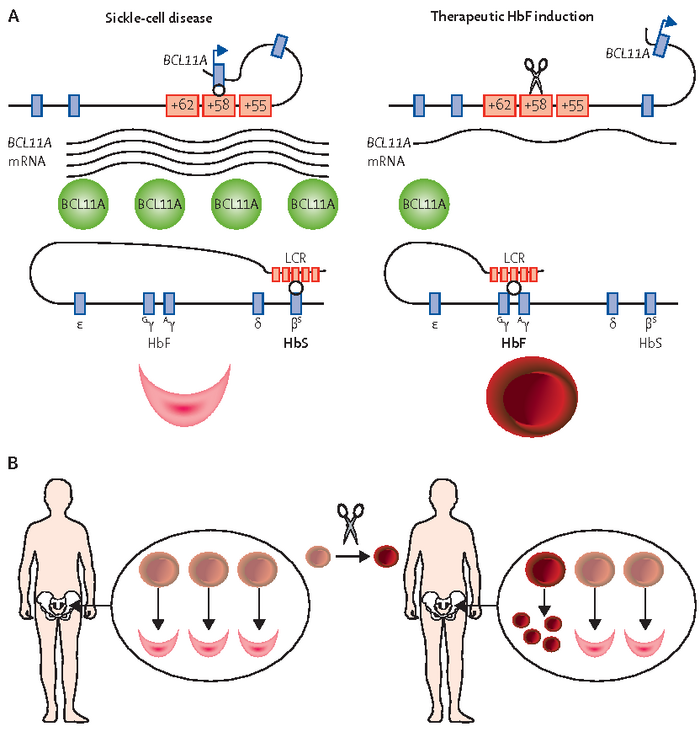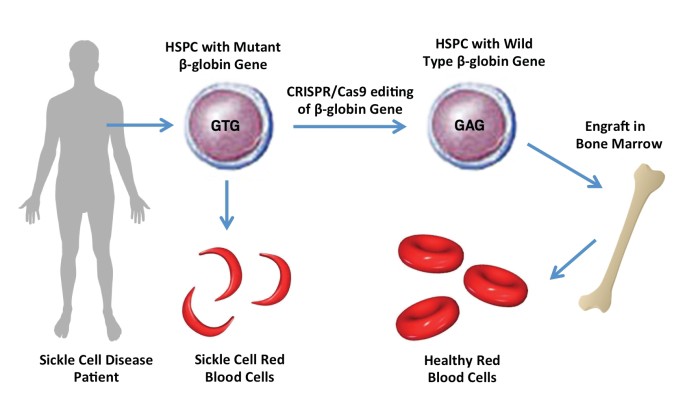Here we summarize genome engineering applications using CRISPRCas9 addressing challenges and future perspectives of CRISPRCas9 as a curative option for SCD. In 2019 CRISPR gene-editing therapy was used for the first time to treat sickle cell disease.
 News Disease Roundup Sickle Cell Disease Crispr Medicine
News Disease Roundup Sickle Cell Disease Crispr Medicine
A clinical trial for a new gene therapy approach to treat sickle cell disease has been approved to proceed by the US Food and Drug Administration.

Crispr gene therapy sickle cell. With the promise of affordable CRISPR gene modification therapy there is hope for individuals worldwide to treat sickle cell disease. That treatment doesnt rely on a virus. Red blood cells from patient with sickle cell disease.
BCL11A is a transcription factor that represses γ-globin expression and fetal hemoglobin in erythroid cells. The first CRISPR gene therapy to cure sickle-cell disease. In the paper published in the New England Journal of Medicine CRISPR-Cas9 Gene Editing for Sickle Cell Disease and beta-Thalassemia researchers reported gene editing.
CRISPR gene therapy for sickle cell disease approved by the FDA. Posted on April 2nd 2019 by Dr. CRISPR And Other Gene Therapy Research in Treating Sickle Cell Anemia As sickle cell anemia is caused by a gene mutation it is a prime candidate for gene therapy.
Sickle cell disease SCD is one of the most common life-threatening monogenic diseases affecting millions of people worldwide. The cells were differentiated from bone marrow with unedited and edited hematopoietic stem cells and the red arrows show the sickled cells. Permanently improving the quality of life is the end goal.
Researchers report early successes using genetic approaches to treat sickle-cell anaemia and β-thalassaemia. Recent discovery of CRISPRCas9 has not only revolutionized genome engineering but has also brought the possibility of translating these concepts into a clinically meaningful reality. Since receiving a landmark treatment with the gene-editing tool CRISPR a sickle cell patient has the strength to care for herself and her children while navigating the.
The first two patients to receive a CRISPR-based treatment for the inherited blood disorders sickle cell disease and beta thalassemia have benefited from the experimental therapy and experienced. The procedure for gene therapy involves extracting stem cells from the patient replacing the mutated gene with a normal copy and reinserting the cells back into the patient. CRISPRCas9-Mediated Correction of the Sickle Mutation in Human CD34 cells.
The researchers are using CRISPR-Cas9 to replace the defective beta-globin gene with a repaired version with the goal of creating normal adult red blood cells and curing the disorder. To try to treat Grays sickle cell doctors started by removing bone marrow cells from her blood last spring. By Dr Molly Godfrey.
Allogenic hematopietic stem cell transplantation is the only known cure for the disease with high success rates but the limited availability of matched sibling donors and the high risk of transplantation-related side effects force the scientific community to envision additional therapies. We performed electroporation of CD34. Those living in developing countries the global poor and those vulnerable to falling into poverty will be the most to benefit from this exciting.
Scientists say they hope. The new trial is a gene knock-in. Next scientists used CRISPR to edit a gene in the cells to turn on the production of.
CRISPR gene therapy shows promise against blood diseases. The treatment involves the gene-editing tool known as CRISPR. That technique reawakens the fetal gene and in at least three patients has alleviated symptoms of sickle cell disease.
Last Updated April 1 2021 CRISPR genome editing technology which was developed at UC Berkeley has been approved for clinical trials to correct gene mutations responsible for sickle cell disease. This correction supports production of red blood. A CRISPR Approach to Treating Sickle Cell.
Targeted genome editing technology can correct the sickle cell disease mutation of the β-globin gene in hematopoietic stem cells. Another sickle cell disease clinical trial that uses the CRISPR gene-editing tool to turn on a fetal form of hemoglobin reported promising results last year. A Mississippi woman is doing well 1 year after undergoing an experimental treatment for sickle cell disease.
Appeared in BioNews 1090. Sickle cell disease is a complex disease that affects the structure and function of hemoglobin the molecule in red blood cells that delivers oxygen around the body.